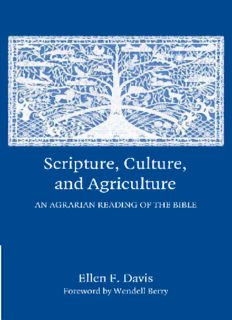
Scripture, Culture, and Agriculture: An Agrarian Reading of the Bible PDF
Preview Scripture, Culture, and Agriculture: An Agrarian Reading of the Bible
scripture,culture,andagriculture Thisbookexaminesthetheologyandethicsoflanduse,especiallythepractices of modern industrialized agriculture, in light of critical biblical exegesis. Nine interrelated essays explore the biblical writers’ pervasive concern for the care of arable land against the background of the geography, social structures, and religiousthoughtofancientIsrael.Thisapproachconsistentlybringsoutneglected aspectsoftexts,bothpoetryandprose,thatarecentraltoJewishandChristian traditions.Ratherthanseekingsolutionsfromthepast,EllenF.Daviscreatesa conversationbetweenancienttextsandcontemporaryagrarianwriters;thusshe provides a fresh perspective from which to view the destructive practices and assumptionsthatnowdominatetheglobalfoodeconomy.Thebiblicalexegesisis wide-rangingandsophisticated;thelanguageisliterateandaccessibletoabroad audience. EllenF.DavisisProfessorofBibleandPracticalTheologyatDukeDivinitySchool. ShehaspreviouslytaughtatUnionTheologicalSeminary,YaleDivinitySchool, andVirginiaTheologicalSeminary.Sheistheauthorofeightbooks,including WondrousDepth:OldTestamentPreaching(2005)andGettingInvolvedwithGod (2001).AlayEpiscopalian,DavisisamemberoftheArchbishopofCanterbury’s BuildingBridgesSeminar. Scripture, Culture, and Agriculture An Agrarian Reading of the Bible . ELLEN F DAVIS DukeDivinitySchool ForewordbyWendellBerry CAMBRIDGE UNIVERSITY PRESS Cambridge, New York, Melbourne, Madrid, Cape Town, Singapore, São Paulo Cambridge University Press The Edinburgh Building, Cambridge CB2 8RU, UK Published in the United States of America by Cambridge University Press, New York www.cambridge.org Information on this title: www.cambridge.org/9780521518345 © Ellen F. Davis 2009 This publication is in copyright. Subject to statutory exception and to the provision of relevant collective licensing agreements, no reproduction of any part may take place without the written permission of Cambridge University Press. First published in print format 2008 ISBN-13 978-0-511-43707-6 eBook (EBL) ISBN-13 978-0-521-51834-5 hardback Cambridge University Press has no responsibility for the persistence or accuracy of urls for external or third-party internet websites referred to in this publication, and does not guarantee that any content on such websites is, or will remain, accurate or appropriate. F orDwayne,Ellie,Raphael,Luca,Ezra,Isaac,Paiter,andNicolaas, withthanksandthanksgiving. (cid:2) Contents ForewordbyWendellBerry pageix Acknowledgments xv Abbreviations xvii Introduction 1 1. RuptureandRe-membering 8 2. ReadingtheBibleThroughAgrarianEyes 21 3. SeeingwithGod:Israel’sPoemofCreation 42 4. LeavingEgyptBehind:EmbracingtheWildernessEconomy 66 5. AWholesomeMateriality:ReadingLeviticus 80 6. CovenantalEconomics:TheBiblicalCaseforaLocalEconomy 101 7. RunningonPoetry:TheAgrarianProphets 120 8. WisdomorSloth?TheCharacterofWork 139 9. TheFaithfulCity 155 Postscript 179 Notes 181 ScriptureIndex 223 Index 231 vii Foreword ThisbookwillbewelcomedgladlybyreadersinterestedintheBible’ssense ofoureconomiclifeandourecologicalresponsibilities.Readingitisaplea- sure and a help. Ellen Davis’s premise is that “the message of the earliest propheticwritersoftheBiblewasdistinctly‘agrarian.’”Hersupportingargu- mentislearned,perceptive,meticulouslydetailed,and,tomymind,utterly convincing.ProfessorDavis,moreover,offersherbookasapartofthepresent and ongoing “agrarian conversation” among some writers, some scientists, andthemultitudeofpatrioticcitizensnowworkingtobuildorrebuildlocal economiesoffoodandfarming. The human situation, as understood by both biblical agrarians and con- temporary ones, is about as follows. We are, howbeit only in part, earthly creatures. We have been given the earth to live, not on, but with and from, andonlyontheconditionthatwecareproperlyforit.Wedidnotmakeit, andweknowlittleaboutit.Infact,wedon’t,andwillnever,knowenough aboutittomakeoursurvivalsureorourlivescarefree.Ourrelationtoour landwillalwaysremain,toasignificantextent,mysterious.Therefore,ouruse ofitmustbedeterminedmorebyreverenceandhumility,bylocalmemory and affection, than by the knowledge that we now call “objective” or “sci- entific.” Above all, we must not damage it permanently or compromise its naturalmeansofsustainingitself.Thebestfarmershavealwaysacceptedthis situationasagiven,andtheyhavehonoredtheissuesofproprietyandscale thatiturgentlyraises. Byrecognizingourinescapabledependenceandourfinallyinsurmountable ignorance,weopenthesubjectofagriculture(as,Ithink,allothersubjects) to questions of every kind. This book seems to have begun with Professor Davis’srealizationthat food production entails at every stage judgments and practices that bear directly onthehealthoftheearthandlivingcreatures,ontheemotional, ix
Description: